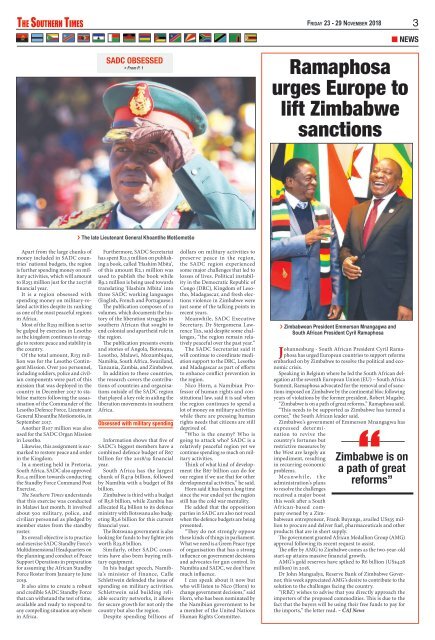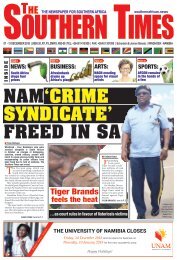You also want an ePaper? Increase the reach of your titles
YUMPU automatically turns print PDFs into web optimized ePapers that Google loves.
<strong>The</strong> <strong>Southern</strong> <strong>Times</strong> Friday 23 - 29 November 2018<br />
3<br />
■ NEWS<br />
SADC OBSESSED<br />
> From P. 1<br />
Ramaphosa<br />
urges Europe to<br />
lift Zimbabwe<br />
sanctions<br />
› <strong>The</strong> late Lieutenant General Khoantlhe Motšomotšo<br />
Apart from the large chunks of<br />
money included in SADC countries’<br />
national budgets, the region<br />
is further spending money on military<br />
activities, which will amount<br />
to R253 million just for the 2017/18<br />
financial year.<br />
It is a region obsessed with<br />
spending money on military-related<br />
activities despite its ranking<br />
as one of the most peaceful regions<br />
in Africa.<br />
Most of the R253 million is set to<br />
be gulped by exercises in Lesotho<br />
as the kingdom continues to struggle<br />
to restore peace and stability in<br />
the country.<br />
Of the total amount, R133 million<br />
was for the Lesotho Contingent<br />
Mission. Over 300 personnel,<br />
including soldiers, police and civilian<br />
components were part of this<br />
mission that was deployed in the<br />
country in December 2017 to stabilise<br />
matters following the assassination<br />
of the Commander of the<br />
Lesotho Defence Force, Lieutenant<br />
General Khoantlhe Motšomotšo, in<br />
September 2017.<br />
Another R107 million was also<br />
used for the SADC Organ Mission<br />
in Lesotho.<br />
Likewise, this assignment is earmarked<br />
to restore peace and order<br />
in the Kingdom.<br />
In a meeting held in Pretoria,<br />
South Africa, SADC also approved<br />
R11.4 million towards conducting<br />
the Standby Force Command Post<br />
Exercise.<br />
<strong>The</strong> <strong>Southern</strong> <strong>Times</strong> understands<br />
that this exercise was conducted<br />
in Malawi last month. It involved<br />
about 500 military, police, and<br />
civilian personnel as pledged by<br />
member states from the standby<br />
roster.<br />
Its overall objective is to practice<br />
and exercise SADC Standby Force’s<br />
Multidimensional Headquarters on<br />
the planning and conduct of Peace<br />
Support Operations in preparation<br />
for assuming the African Standby<br />
Force Roster from January to June<br />
2019.<br />
It also aims to create a robust<br />
and credible SADC Standby Force<br />
that can withstand the test of time,<br />
available and ready to respond to<br />
any compelling situation anywhere<br />
in Africa.<br />
Furthermore, SADC Secretariat<br />
has spent R11.3 million on publishing<br />
a book, called ‘Hashim Mbita’,<br />
of this amount R2.1 million was<br />
used to publish the book while<br />
R9.2 million is being used towards<br />
translating ‘Hashim Mbita’ into<br />
three SADC working languages<br />
(English, French and Portuguese.)<br />
<strong>The</strong> publication composes of 10<br />
volumes, which documents the history<br />
of the liberation struggles in<br />
southern African that sought to<br />
end colonial and apartheid rule in<br />
the region.<br />
<strong>The</strong> publication presents events<br />
and stories of Angola, Botswana,<br />
Lesotho, Malawi, Mozambique,<br />
Namibia, South Africa, Swaziland,<br />
Tanzania, Zambia, and Zimbabwe.<br />
In addition to these countries,<br />
the research covers the contributions<br />
of countries and organisations<br />
outside of the SADC region<br />
that played a key role in aiding the<br />
liberation movements in southern<br />
Africa.<br />
Obsessed with military spending<br />
Information shows that five of<br />
SADC’s biggest members have a<br />
combined defence budget of R67<br />
billion for the 2018/19 financial<br />
year.<br />
South Africa has the largest<br />
chunk of R47.9 billion, followed<br />
by Namibia with a budget of R6<br />
billion.<br />
Zimbabwe is third with a budget<br />
of R5.8 billion, while Zambia has<br />
allocated R4 billion to its defence<br />
ministry with Botswana also budgeting<br />
R3.6 billion for this current<br />
financial year.<br />
<strong>The</strong> Botswana government is also<br />
looking for funds to buy fighter jets<br />
worth R23.8 billion.<br />
Similarly, other SADC countries<br />
have also been buying military<br />
equipment.<br />
In his budget speech, Namibia’s<br />
minister of finance, Calle<br />
Schlettwein defended the issue of<br />
spending on military activities.<br />
Schlettwein said building reliable<br />
security networks, it allows<br />
for secure growth for not only the<br />
country but also the region.<br />
Despite spending billions of<br />
dollars on military activities to<br />
preserve peace in the region,<br />
the SADC region experienced<br />
some major challenges that led to<br />
losses of lives. Political instability<br />
in the Democratic Republic of<br />
Congo (DRC), Kingdom of Lesotho,<br />
Madagascar, and fresh elections<br />
violence in Zimbabwe were<br />
just some of the talking points in<br />
recent years.<br />
Meanwhile, SADC Executive<br />
Secretary, Dr Stergomena Lawrence<br />
Tax, said despite some challenges,<br />
“the region remain relatively<br />
peaceful over the past year.”<br />
<strong>The</strong> SADC Secretariat said it<br />
will continue to coordinate mediation<br />
support to the DRC, Lesotho<br />
and Madagascar as part of efforts<br />
to enhance conflict prevention in<br />
the region.<br />
Nico Horn, a Namibian Professor<br />
of human rights and constitutional<br />
law, said it is sad when<br />
the region continues to spend a<br />
lot of money on military activities<br />
while there are pressing human<br />
rights needs that citizens are still<br />
deprived of.<br />
“Who is the enemy? Who is<br />
going to attack who? SADC is a<br />
relatively peaceful region yet we<br />
continue spending so much on military<br />
activities.<br />
Think of what kind of development<br />
the R67 billion can do for<br />
our region if we use that for other<br />
developmental activities,” he said.<br />
Horn said it has been a long time<br />
since the war ended yet the region<br />
still has the cold war mentality.<br />
He added that the opposition<br />
parties in SADC are also not vocal<br />
when the defence budgets are being<br />
presented.<br />
“<strong>The</strong>y do not strongly oppose<br />
these kinds of things in parliament.<br />
What we need is a Green Peace type<br />
of organisation that has a strong<br />
influence on government decisions<br />
and advocates for gun control. In<br />
Namibia and SADC, we don’t have<br />
much influence.<br />
I can speak about it now but<br />
who will listen to Nico (Horn) to<br />
change government decisions,” said<br />
Horn, who has been nominated by<br />
the Namibian government to be<br />
a member of the United Nations<br />
Human Rights Committee.<br />
› Zimbabwean President Emmerson Mnangagwa and<br />
South African President Cyril Ramaphosa<br />
Johannesburg - South African President Cyril Ramaphosa<br />
has urged European countries to support reforms<br />
embarked on by Zimbabwe to resolve the political and economic<br />
crisis.<br />
Speaking in Belgium where he led the South African delegation<br />
at the seventh European Union (EU) – South Africa<br />
Summit, Ramaphosa advocated for the removal and of sanctions<br />
imposed on Zimbabwe by the continental bloc following<br />
years of violations by the former president, Robert Mugabe.<br />
“Zimbabwe is on a path of great reforms,” Ramaphosa said.<br />
“This needs to be supported as Zimbabwe has turned a<br />
corner,” the South African leader said.<br />
Zimbabwe’s government of Emmerson Mnangagwa has<br />
expressed determination<br />
to revive the<br />
“<br />
country’s fortunes but<br />
restrictive measures by<br />
Zimbabwe is on<br />
a path of great<br />
reforms”<br />
the West are largely an<br />
impediment, resulting<br />
in recurring economic<br />
problems.<br />
Me a nw h i le , t he<br />
administration’s plans<br />
to resolve the challenges<br />
received a major boost<br />
this week after a South<br />
African-based company<br />
owned by a Zimbabwean<br />
entrepreneur, Frank Buyanga, availed US$35 million<br />
to procure and deliver fuel, pharmaceuticals and other<br />
products that are in short supply.<br />
<strong>The</strong> government granted African Medallion Group (AMG)<br />
approval following its recent request to assist.<br />
<strong>The</strong> offer by AMG to Zimbabwe comes as the two-year-old<br />
start-up attains massive financial growth.<br />
AMG’s gold reserves have spiked to R6 billion (US$428<br />
million) in 2018.<br />
Dr John Mangudya, Reserve Bank of Zimbabwe Governor,<br />
this week appreciated AMG’s desire to contribute to the<br />
solution to the challenges facing the country.<br />
“(RBZ) wishes to advise that you directly approach the<br />
importers of the proposed commodities. This is due to the<br />
fact that the buyers will be using their free funds to pay for<br />
the imports,” the letter read. – CAJ News




